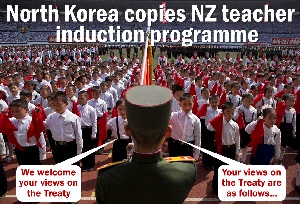Everyone shall have the right to hold opinions without interference.
… The law shall prohibit any discrimination … on any ground [including] political or other opinion…
– International Covenant on Civil and Political Rights 1966, Articles 19.1 and 26.
 Teachers have always had to be careful about what they say to their charges,
Teachers have always had to be careful about what they say to their charges,
but they now have to toe the political line as well
Professional people have a ‘public’ life as working professionals, and a ‘private’ life as ordinary citizens. This may occasionally lead to inner conflict. The nurse who does not believe in vaccination may find herself pumping vaccines into thousands of children as part of a mass vaccination campaign. The tax accountant who firmly believes that the so-called progressive tax scale is morally wrong and should be replaced with a flat tax rate nevertheless finds himself enforcing the current system. The lawyer who passionately disapproves of a controversial new law is still expected to apply it when engaged in legal proceedings.
Professionals are bound to abide by the laws and regulations governing that profession in the exercise of their duties. That does not mean, however, that they are bound to agree with them, let alone to be personally committed to them. There is nothing stopping the above nurse from belonging to an anti-vaccination lobby group, or the accountant from writing letters to the editor of newspapers and magazines that decry the current tax regime, or the lawyer from making disparaging remarks about that law in a public forum. After all, professionals are also citizens of a democracy, and as such they are entitled to utter critical or even dissenting opinions. No professional body or government organ is entitled to ‘interfere’ with people’s rights to form and hold (and voice) their own opinions as per the above international human rights maxim (subject, of course, to the usual constraints on freedom of expression). The imposition of a specific political ideology on people, or a given group of people, is a blatant instance of such ‘interference’.
We do expect our health professionals to be committed to the promotion of health among the population, tax accountants to the principles of fairness and equity in taxation, and lawyers to the cause of justice. But it is hard, if not impossible in a democracy, to take disciplinary action against professionals who are doing a good job by the standards of that profession because they do not avidly believe in what they are doing. Which is just as well, for professionals should be judged by measurable performance indicators, not by their personal views regarding the nuances of what they are doing. Besides, there would be no progress if professionals disgruntled with established norms and procedures were automatically censured.
The teaching profession too is now governed by professional standards in most jurisdictions. In some instances, these standards are mere platitudes; in others, they have teeth. A teacher does not have to ‘break the law’ to get into hot water. Teachers who adopt a cavalier attitude towards their professional duty of care can be disciplined or even have their licence to teach revoked by professional tribunals. Teachers in the UK, Australia or NZ can find themselves in the hot-seat for professional negligence through, to quote Justice Kirby way back in 1982, “indifferent, ill-motivated, incompetent or just plain lazy teaching” All this I agree with whole-heartedly.
An exemplary set of standards is the AITSL Australian Professional Standards for Teachers. These mostly allude to behaviours relating to professional practice that are amenable to objective evaluation – professional competencies pertaining to the teaching/learning process. One that caught my eye refers to the use of differentiated instruction when appropriate – very progressive!
Also among these standards is “Strategies for teaching Aboriginal and Torres Strait Islands students” which focuses on the practicalities of developing teaching approaches that are effective for those learners as special needs groups. I have no gripe with that. But a related standard begins to wander off into the ideological realm – “Understand and respect Aboriginal and Torres Strait Islands people to promote reconciliation between Indigenous and non-Indigenous Australians”. However, this is not to say that Australian teachers are being deprived of the right to voice nonconformist opinions on indigenous issues in their capacity as private citizens. At the same time, in their professional capacity, teachers are expected to not overtly show disrespect for those fellow Australians which would, after all, be a dereliction of the professional duty of care towards students from those communities. So I can live with this standard.
Now to the expectations imposed on NZ teachers. Existing Practising Teachers Criteria standards include “demonstrate commitment to bicultural partnership in Aotearoa New Zealand” and “work effectively within the bicultural context of Aotearoa New Zealand”. These standards clearly target the political domain, for biculturalism is an overtly power-sharing paradigm (and thereby a political maxim), unlike multiculturalism which is more of a social ideology. Demonstrating a commitment to a bicultural partnership forces on teachers a particular political model arising from a particular interpretation of the Treaty of Waitangi.
Shouldn’t that read “NZ copies NK teacher induction programme”?
Toe the party line or else…
On 1 July, this requirement is being beefed up to “Demonstrate a commitment to a bicultural Aotearoa New Zealand”. Passive acquiescence won’t do any more: teachers must now be personally committed to this political paradigm. Where my alarm bells were ringing before, they’re now shrieking. This is where the new standards leave the democratic domain and enter the totalitarian realm. Bang go teachers’ rights as citizens to hold their own opinions without interference. And I’ll be blowed if I can see what any of this has to do with professional competencies. It’s the imposition of a political ideology, pure and simple.
Ominously, a “lack of commitment” will be shown by “refusing or deliberately failing to engage in professional development opportunities to build Māori cultural competency.” ‘Cultural competency’ training (see Muriel Newman and Fiona Mackenzie’s articles of 7 May) strikes me as a Trojan Horse for a vetting process to censure or get rid of political dissenters in the job, or better still, prevent the ideologically noncompliant from getting into it in the first place. Membership of the teaching profession now comes with mandatory membership of the bicultural political club (if it didn’t already!!).
NZ teachers are being deprived of a fundamental right of all citizens in a democracy – the right to disagree with ideological dicta promulgated by the political elite. This right is not about letting teachers get away with denigrating or abusing Māori kids, which falls foul of the duty of care and professional ethics. This is about hitting teachers who are actual or potential political dissenters with a stark choice: submit or vacate. And that is enforced ideological conformity – the antithesis of democracy and an infringement of teachers’ internationally acknowledged human rights.
Barend Vlaardingerbroek BA, BSc, BEdSt, PGDipLaws, MAppSc, PhD is an associate professor of education at the American University of Beirut. Feedback welcome at bv00@aub.edu.lb . He’d especially love to hear from you if you’re a teacher who is not prepared to wear this.


